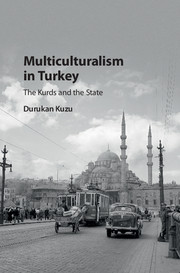Book contents
- Multiculturalism in Turkey
- Multiculturalism in Turkey
- Copyright page
- Contents
- Figures
- Tables
- 1 Introduction
- 2 The Theory of National Minorities
- 3 Multiculturalism for National Minorities
- 4 Turkey's Kurdish Dilemma
- 5 When Multiculturalism Does Not Fit
- 6 Can Multiculturalism Really End Ethnic Conflicts?
- 7 Conclusion
- Bibliography
- Index
6 - Can Multiculturalism Really End Ethnic Conflicts?
Published online by Cambridge University Press: 06 March 2018
- Multiculturalism in Turkey
- Multiculturalism in Turkey
- Copyright page
- Contents
- Figures
- Tables
- 1 Introduction
- 2 The Theory of National Minorities
- 3 Multiculturalism for National Minorities
- 4 Turkey's Kurdish Dilemma
- 5 When Multiculturalism Does Not Fit
- 6 Can Multiculturalism Really End Ethnic Conflicts?
- 7 Conclusion
- Bibliography
- Index
Summary
- Type
- Chapter
- Information
- Multiculturalism in TurkeyThe Kurds and the State, pp. 147 - 168Publisher: Cambridge University PressPrint publication year: 2018



